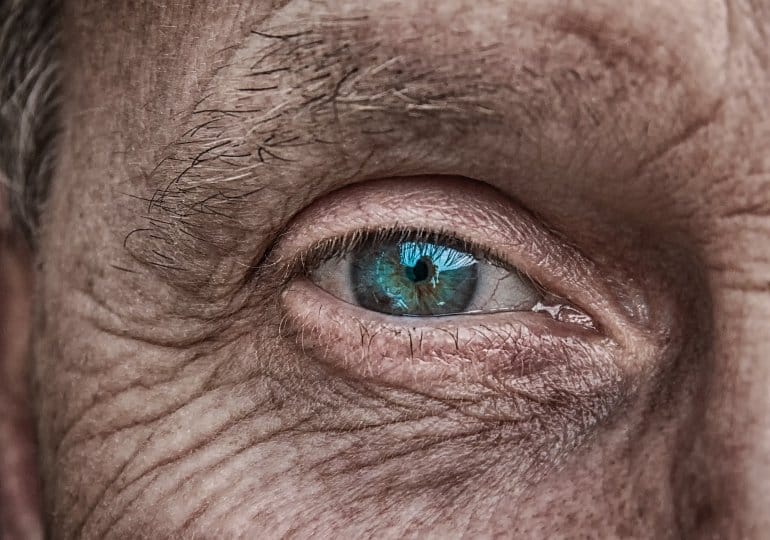Summary: More severe COVID-19 outcomes associated with age-related macular degeneration likely arise from a genetic predisposition in addition to higher levels of Pdgf in blood serum.
Source: Boston University
Recent evidence has emerged to suggest that age-related macular degeneration (AMD) is a clinical risk factor for increased risk for infection and mortality. AMD has been reported to confer higher risk of severe complications of SARS-CoV-2 infection, including respiratory failure and death (25 percent), a risk which is higher than Type 2 diabetes (21 percent) and obesity (13 percent).
Considering these observations, researchers from Boston University Chobanian & Avedisian School of Medicine hypothesized that AMD and COVID-19 share common genetic risk factors and designed and executed a study that identified a novel association of the two diseases with variants in the PDGFB gene. This gene encodes a platelet derived growth factor (Pdgf) which has a role in the formation of new blood vessels and is involved in the abnormal blood vessel changes that occur in AMD.
They also found that more severe COVID-19 outcomes were associated with AMD likely arising from genetic predisposition to dysfunction involving complement proteins, as well as with a higher level of Pdgf in blood serum.
“Our findings add to the body of evidence for the increased risk of infection and mortality from COVID-19 among AMD patients. Our analysis lends credence to previously reported clinical studies that found those with AMD have a higher risk for COVID-19 infection and severe disease, and that this increased risk may have a genetic basis,” explained co-corresponding author Lindsay A. Farrer, PhD, chief of biomedical genetics.
The BU research team conducted a genome-wide search for variants that are jointly associated with AMD and each of three COVID-19 outcomes (infection rate, critical illness and hospitalization) using large genetic datasets that contained tens of thousands of individuals. These datasets were previously assembled and studied separately for genetic factors contributing to the risk of AMD and for each of the COVID-19 disease outcomes.
Subsequently, the researchers analyzed publicly available data from patients with AMD or COVID-19 and control groups to assess the association of variants in PDGFB with the gene activity.
Finally, they employed an analytical technique that allowed them to investigate causal relationships between PDGFB gene variants, Pdgfb concentration in blood, AMD, and COVID-19 outcomes.
According to the researchers, these findings suggest that lowering PDGFB gene activity and serum PDGF concentration may reduce the severity of COVID-19, particularly among older people.

“Therapeutic strategies combining anti-VEGF therapy (a current treatment for AMD that limits blood vessel growth in the eye that can harm vision) with antagonists (drugs that bind to receptors) for blocking PDGF signaling have been considered even more effective than the single VEGF treatment and are currently under investigation in clinical trials,” added co-corresponding author Manju L. Subramanian, MD, associate professor of ophthalmology.
The researchers believe this discovery of shared genetic risk factors will require a larger sample size for critical illness and hospitalizations to better understand the shared pathology and risk factors that contribute to worsening clinical outcomes in both disease states.
Funding: This work was supported by National Institutes of Health grants RF1 AG057519, R01 AG069453, R01 AG048927, U19 AG068753, and U01 AG062602.
About this AMD and COVID-19 research news
Author: Gina DiGravio
Source: Boston University
Contact: Gina DiGravio – Boston University
Image: The image is in the public domain
Original Research: Open access.
“Genome-Wide Pleiotropy Study Identifies Association of PDGFB with Age-Related Macular Degeneration and COVID-19 Infection Outcomes” by Lindsay A. Farrer et al. Journal of Clinical Medicine
Abstract
Genome-Wide Pleiotropy Study Identifies Association of PDGFB with Age-Related Macular Degeneration and COVID-19 Infection Outcomes
Age-related macular degeneration (AMD) has been implicated as a risk factor for severe consequences from COVID-19.
We evaluated the genetic architecture shared between AMD and COVID-19 (critical illness, hospitalization, and infections) using analyses of genetic correlations and pleiotropy (i.e., cross-phenotype meta-analysis) of AMD (n = 33,976) and COVID-19 (n ≥ 1,388,342) and subsequent analyses including expression quantitative trait locus (eQTL), differential gene expression, and Mendelian randomization (MR). We observed a significant genetic correlation between AMD and COVID-19 infection (rG = 0.10, p = 0.02) and identified novel genome-wide significant associations near PDGFB (best SNP: rs130651; p = 2.4 × 10−8) in the pleiotropy analysis of the two diseases.
The disease-risk allele of rs130651 was significantly associated with increased gene expression levels of PDGFB in multiple tissues (best eQTL p = 1.8 × 10−11 in whole blood) and immune cells (best eQTL p = 7.1 × 10−20 in T-cells). PDGFB expression was observed to be higher in AMD cases than AMD controls {fold change (FC) = 1.02; p = 0.067}, as well as in the peak COVID-19 symptom stage (11–20 days after the symptom onset) compared to early/progressive stage (0–10 days) among COVID-19 patients over age 40 (FC = 2.17; p = 0.03) and age 50 (FC = 2.15; p = 0.04). Our MR analysis found that the liability of AMD risk derived from complement system dysfunction {OR (95% CI); hospitalization = 1.02 (1.01–1.03), infection = 1.02 (1.01–1.03) and increased levels of serum cytokine PDGF-BB {β (95% CI); critical illness = 0.07 (0.02–0.11)} are significantly associated with COVID-19 outcomes.
Our study demonstrated that the liability of AMD is associated with an increased risk of COVID-19, and PDGFB may be responsible for the severe COVID-19 outcomes among AMD patients.






